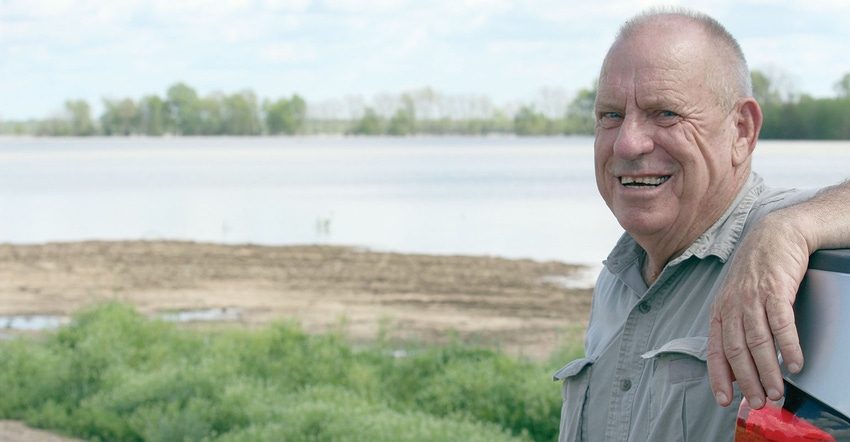
Flood waters have taken over Issaquena County, Miss., and are holding farmers and 212,000 acres of farmland hostage. Roads are cut off to houses, hundreds of people have been displaced from their homes, and inmates from the Issaquena County Correctional Facility were sent to transfer 30 dump truck loads of sand into sandbags to be used as levees around homes before water levels rise higher threatening even more damage.
Mississippi row crop farmer Billy Whitten, along with his son, Brad, operate Whitten & Whitten, Inc. They should have their corn in the ground by now. It is already April 11, and not a seed has been drilled. “We normally farm about 1,400 acres, but every acre, except maybe a few, are covered in floodwater,” says Whitten. “Some of that ground has been underwater since the first part of February.”
Whitten gets daily updates on his smartphone from the Mississippi Levee Board. “The 16-day forecast looks like the Mississippi River will hold steady for the next 10 days, then fall close to the flood stage after 14 days and rebound back up to the 2 to 4 feet above flood stage by the first of May,” says Whitten. “Highway 61 runs along Deer Creek Ridge. That’s some of the highest ground in our area. If the water recedes on some of that ground, we might be able to get in and plant a few acres.”
In 2011, a historic flood occurred at Vicksburg, Miss. The Mississippi River hit a record high, but rain was scarce across the Mississippi Delta. “During that flood, our levee system was holding over 16 feet of water off us,” says Whitten. “But we were one big rain away from disaster — which is where we are again right now.”
Water, Water, Water
When the water level of the Mississippi River is higher than the water level behind Steele Bayou Control Structure, the structure’s gates must remain closed. “That structure usually prevents the Yazoo and Mississippi Rivers from backing up and flooding us and the Delta further,” says Whitten. “Those gates were closed around the middle of February and finally re-opened on April 1.” “As long as the Mississippi River isn’t rising, we’re safe, but when it rises, we know The Corps of Engineers potentially will have to close those gates and that worries everyone.”
The scary scenario started last October when the rain began. Whitten and the rest of the farmers in the south Delta got very little field work done, and the rains have not given them a break. “I believe the Mississippi River started rising in January,” says Whitten. “I’m on the board of Valley Park Grain Elevator and the water has been so high on the river, we’ve not been able to load out any barges. We’ve even had to move some grain from two of our bins that are built a little lower than the others.”
A Cessna 182 formerly owned by crop duster Ralph Frisbee, who passed away in 2016, was moved out of the old hanger by Frisbee’s son before the hanger was overtaken with water. The plane is now tied down at the end of a line of farm equipment on the high-ground of a non-active railroad track, protecting the equipment and the plane from the high water — for now.
A “road closed” sign prohibits access to the Valley Park Baptist Church. “We’ve been holding worship services across the highway in our parsonage,” says Whitten.
Semi-tractor trailers once used to haul various ag products are now filled with furniture from houses belonging to Whitten family members whose houses are also surrounded by sandbagged levees covered with plastic tarps. “I have a pivot that sits on one field where the opposite end of the field is lower in elevation.
“In 2011, the Mississippi River was a lot higher than it is now and backwater covered half of that field — but, we got the other half planted,” says Whitten. “We had so little rain that year, I actually had to turn on that pivot to irrigate the part of the field I was able to plant. It was a strange sight.”
Brad Whitten rode down the side of Highway 61 on a Polaris. He was hauling a pump, heading to a house owned by Billy that has been leveed up with sandbags for weeks. “When it rains, we have to pump water out from inside the levee to keep the house from flooding,” says Whitten. “The same scenario is occurring at the levee — which keeps the Mississippi River from getting to us. When the river is too high, Steele Bayou gates must remain closed and they didn’t install a pumping system that would allow water to be pumped from south Delta back over the levee to the Mississippi River.”
Waves from Whitten’s pickup traveled across the road behind his shop as he slowly turned his truck around after explaining his options of disaster relief or crop insurance. “You just about have to have a total disaster for crop insurance to kick in,” he says.
As we headed back to drier ground so he could check on the leveed-up houses, he glanced back at a sign beside the flooded field that read “Dead End.” Whitten just hopes the only thing that ends is the rain that continues to haunt farmers in the south Delta.
About the Author(s)
You May Also Like




